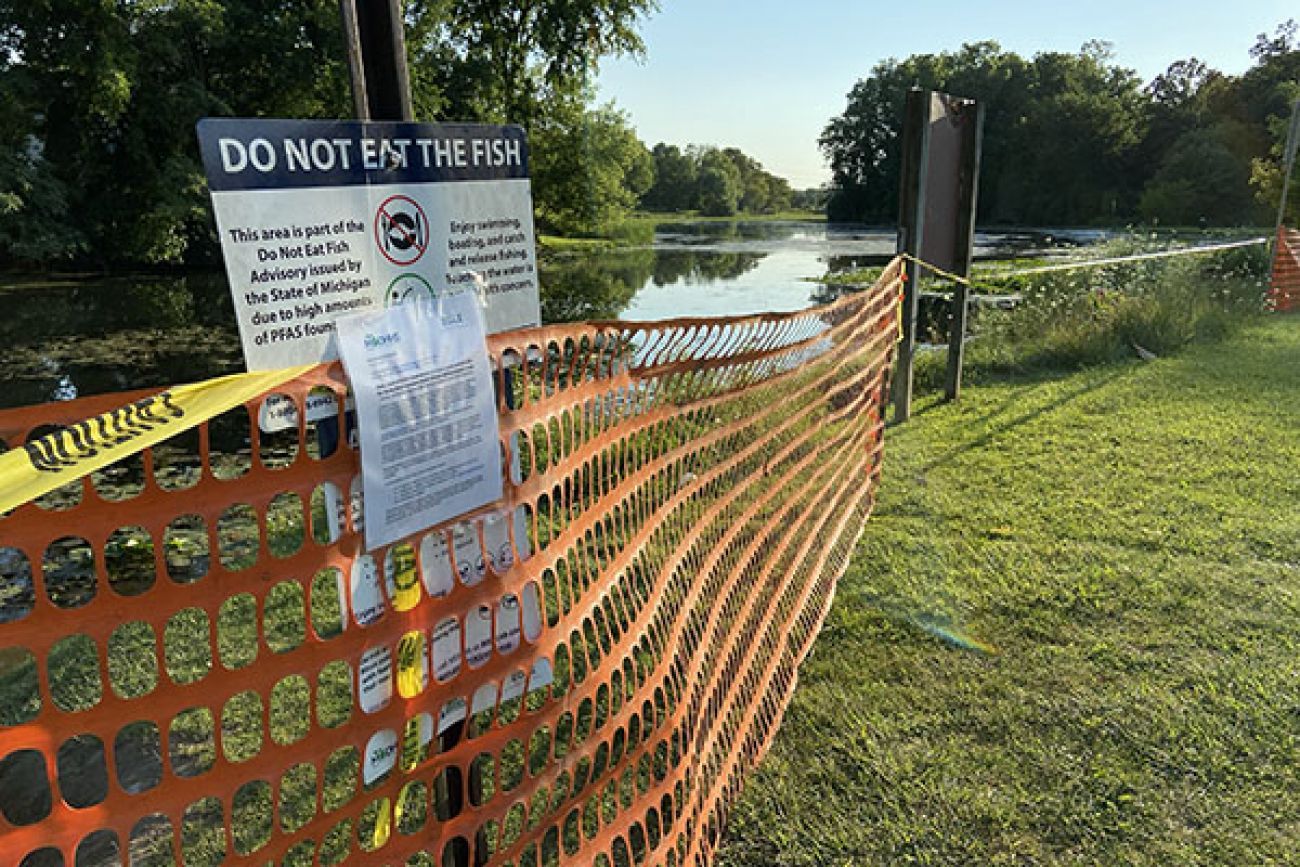
By Kelly House, Bridge Michigan
The Great Lakes News Collaborative includes Bridge Michigan; Circle of Blue; Great Lakes Now at Detroit Public Television; and Michigan Radio, Michigan’s NPR News Leader; who work together to bring audiences news and information about the impact of climate change, pollution, and aging infrastructure on the Great Lakes and drinking water. This independent journalism is supported by the Charles Stewart Mott Foundation. Find all the work HERE.
- Expect climate change, pollution and water affordability to gain new traction in Democratically-controlled Lansing
- Environmentalists also plan to rollback Republican laws
A power shift is coming to Lansing, likely changing the state Legislature’s stance on environmental issues from water access to pollution control.
After decades of Republican leadership in Lansing with an emphasis on scaling back environmental regulations and giving businesses more influence in state decision making, some Democratic lawmakers and environmental groups told Bridge they expect the pendulum to swing back, as the House and Senate work in concert with a re-elected Democratic governor.
House and Senate leaders have said they’re still putting together their priorities for the coming legislative session, but environmental advocates expect a focus on reversing Republican-enacted laws they see as detrimental to the environment, and reintroducing Democratically-sponsored bills that languished in the Republican-controlled Legislature.
The ban on local plastic bag bans could be on the chopping block, and pollution laws could be up for a rewrite. Here’s a sampling of issues that could be up for debate in Lansing this year.
Water shutoffs and affordability
After years of applying public pressure to end water shutoffs that plague Michiganders who fall behind on bills, water affordability advocates won a partial victory in 2020.
In recognition that hand-washing could prevent the spread of COVID-19, lawmakers imposed a moratorium on water shutoffs through March 2021, and some cities kept local moratoriums in place even longer.
With Democrats now controlling Lansing, advocates say they’re aiming to pass statewide water affordability legislation.
Stephanie Chang, D-Detroit, who sponsored the 2020 moratorium bill, has repeatedly pushed bills to increase shutoff protections and create a state water affordability plan.
One of several bills pushed by Chang would have protected certain classes of people from shutoffs, such as seniors, pregnant people and parents of children. Another would have required utilities to disclose more data on their water rates and shutoffs.
Chang said the issue will be her key priority in the coming term.
“I’m feeling like there’s a huge opportunity to get more done,” Chang said. “But because these bills haven’t gotten to hearing before in most cases, I think there’s probably more vetting and more conversations that have to happen.”
The push for affordability comes as water systems across the state enact steep rate hikes to cover badly-needed upgrades to failing pipes and plants. Chang said those widespread impacts of disinvestment in water infrastructure demand “a broader statewide approach.”
Polluter pay
Michigan’s law to hold industry liable for cleaning up its pollution — known as “polluter pay” — was once one of the nation’s strongest. It set aggressive cleanup standards for contaminated sites, and extended liability to both current and former site operators.
But in 1995, during Republican Gov. John Engler’s tenure, lawmakers significantly weakened the law. The changes shifted its focus from cleanup to containment, and dramatically narrowed who could be held liable for cleanup costs.
Michigan is now home to thousands of “orphan” contaminated sites where those responsible for causing pollution are no longer around, leaving the public to pay for cleanup.
Multiple past attempts to strengthen Michigan’s cleanup standards have failed. But momentum began building for another attempt after a multi-thousand-gallon release of liquid containing carcinogenic hexavalent chromium from Tribar Manufacturing’s Wixom plating facility last August.
The spill prompted fears of yet another threat to Ann Arbor’s drinking water, which is already threatened with PFAS contamination and an underground dioxane plume emanating from the former Gelman Sciences property.
Ann Arbor Sen. Jeff Irwin has repeatedly attempted bills to strengthen Michigan’s polluter pay law. The most recent one, which never got a hearing in the just-closed legislative session, would have required those responsible for pollution to meet state drinking water standards during cleanup, as long as it’s technically feasible to do so.
With Democrats in control of the Legislature, Irwin said he expects the issue to get new traction.
“I think you’re gonna see us focus on kitchen table issues,” such as lowering taxes, Irwin said. “And you know what else goes on a kitchen table? Drinking water.”
Proponents of stronger cleanup laws argue in addition to requiring more complete cleanups after spills happen, the threat of stiff consequences acts as a pollution deterrent, scaring companies into trying harder to prevent spills.
Without such deterrents, said Bridget Vial of the Michigan Environmental Justice Coalition, “pollution is profitable” for industry.
Opponents argue overly-strict cleanup standards hinder redevelopment of contaminated sites, penalize companies for past chemical releases that were legal at the time, and wrongly punish new property owners for contamination they didn’t cause.
“If these companies were following the rules that were set, based on the best science that they had at the time,” said Sen. Rick Outman, R-Six Lakes, “I find it hard to hold them liable since they weren’t breaking any laws.”
Climate change
Whitmer told Bridge in November she wants to work with legislative leaders to write aspects of her administration’s climate action plan into law, ensuring that they “transcend a change in administration.”
The governor has so far declined to get specific about the climate policies she may push in 2023. But as Bridge reported earlier this month, advocates have a long wishlist.
It includes requiring utilities to build more wind and solar arrays, regulating the build-out of electric vehicle infrastructure, and enacting laws to make it easier for residents and communities to install solar panels or make their home more energy-efficient.
Republican legislative leaders remained tepid this year on the topic of climate policy. Eight months since the Whitmer administration released its climate plan, incoming Senate Minority Leader Aric Nesbitt, R-Lawton, told Bridge he still hasn’t read the plan.
And any proposed new mandates for industry are likely to face pushback from business groups.
“There’s always a really important discussion that has to take place,” said Mike Alaimo, director of environmental and energy affairs with the Michigan Chamber of Commerce. “Are we putting into place goal posts that are economically feasible and achievable?”
Spending Michigan’s COVID windfall
Lawmakers are expected to resume talks early this year about how to spend Michigan’s $6 billion surplus. And the state still has money to spend from the Biden administration’s infrastructure and climate bills.
While policy changes tend to face long and uncertain paths to passage in Lansing, Democrats could advance their environmental agenda by spending that money strategically, said Barry Rabe, a University of Michigan political scientist who studies environmental issues.
“The question becomes, how could the legislature take maximum advantage of funding coming from Washington to make it more effective?” Rabe said.
Environmentalists are expected to push for spending on home weatherization, public transportation to reduce carbon emissions, wetlands and stormwater upgrades to cope with worsening floods, and other priorities.
Water infrastructure challenges, from removing lead service lines to fixing pipes and treatment plants that are crumbling after decades of underinvestment, also remain a key priority.
Whitmer said lawmakers did “some really good work” by addressing water infrastructure needs in a $4.8 billion supplemental budget passed earlier in 2022. But as Bridge has reported, the money is not enough.
Reversing Republican policies
Several lawmakers and advocates told Bridge they anticipate early action to reverse Republican-crafted policies they see as bad for the environment.
“If the Dems are smart, they’ll message a lot of this stuff as ‘We’re going back to the way things were intended,’” said Nick Schroeck, an environmental law expert at University of Detroit Mercy.
Among the Republican creations that could be in the crosshairs:
- A 2016 law that bans local municipalities from banning plastic bags or charging a fee for using them. Ann Arbor’s Irwin told Bridge he plans to introduce a bill that would repeal the ban.
- A 2018 law that prohibits Michigan regulators from adopting rules more stringent than federal standards, except in narrow circumstances. Environmentalists have criticized the law, saying it thwarts efforts to ramp up Michigan’s pollution protections.
- The Environmental Science Advisory Board, Environmental Permit Review Commission and the Environmental Rules Review Committee, three panels established under Republican Gov. Rick Snyder that gave industry new ways to intervene in state environmental decisions. Environmentalists dubbed them “polluter panels,” and Republican legislative leaders blocked Whitmer’s attempt to abolish them during her first term.
Jameson, of the environmental council, called the push to undo Republican policies the “fix it” portion of environmentalists’ agenda, designed to make the state’s environmental decision making “less onerous and make more sense.”
Dam safety
Michigan spent big in 2022 to repair the state’s crumbling dams. But bills to strengthen Michigan’s lax dam safety laws failed to get similar traction despite vows of support from Republican legislative leaders.
Outman, the Republican senator who sponsored part of the reform package, said he isn’t sure why the bills never got a hearing in the committee he chaired.
“I certainly pushed for it,” Outman said. “It must have been a leadership decision or maybe a budgetary decision.”
Members of a state-appointed task force who warned in 2021 that Michigan’s dams need “immediate attention” to prevent future failures have said the state’s dam safety shortcomings remain a pressing environmental and public safety issue.
Jameson, of the environmental council, said she sees potential for the reforms to be floated again this year.
“It’s clear to everybody that there is a problem,” she said. “And we need to do something because we can’t continue to have these sorts of failures.”
Catch more news at Great Lakes Now:
Michigan tribes, state reach tentative deal on Great Lakes fishing access
Divided Congress: Smooth sailing or choppy waters for Great Lakes programs?
Featured image: A chromium spill from Tribar Manufacturing’s chrome-plating plant into the Huron River prompted renewed calls to tighten Michigan’s pollution laws — one of several issues that Democrats could push in Lansing this year. (Bridge photo by Kelly House)
1 Comment
-
All this push for harder pollution laws, yet Michigan lets Canada bring their trash to our landfills. With the largest fresh water concentration in the world, we shouldn’t have the massive amount of landfills that we do.




